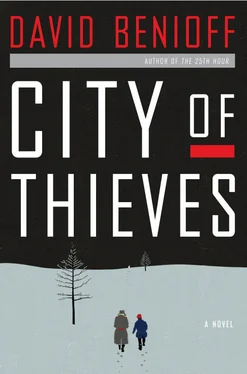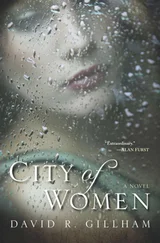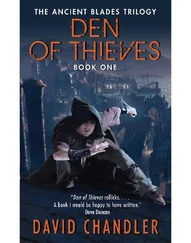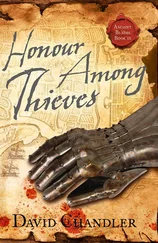Behind the half-tracks came eight-wheeled armored cars, caterpillar-tracked heavy mortars, and light trucks carrying troopers seated on parallel benches, faces weary and unshaven, rifles strapped to their shoulders, huddled up in their white anoraks.
We heard curses from the front of the convoy, drivers leaning out of their windows to find out what the trouble was. One of the self-propelled artillery pieces had slipped a tread, and while its operators scurried to fix it, the howitzer blocked everything behind it. The infantrymen took the opportunity to jump out of their trucks and piss along the side of the road. Soon there was a line of several hundred troopers and half-track drivers and artillerymen stamping their boots and hollering to their friends, leaning back to see who could launch their stream the farthest. Steam rose from the yellow snow.
“Look at these ass-lickers pissing on our land,” muttered Kolya. “They won’t be laughing so loud when I squat down to shit in the middle of Berlin.” The thought cheered him. “Maybe that’s why I can’t squeeze one out. My bowels are waiting for victory.”
“Patriotic bowels.”
“Every part of me is patriotic. My cock whistles the ‘Soviet Hymn’ when it comes.”
“Whenever I hear you two talking, it’s always cocks and asses,” said Vika. She had crept up behind us in her usual silent way, startling me when she spoke. “Why don’t you both strip naked and get it over with?”
“It’s not me he wants to strip naked,” Kolya said with a leer.
I felt a rush of anger and embarrassment, but Vika ignored the comment, keeping an eye out for watchful guards and other prisoners as she slipped us both half slices of her good rye bread.
“You see the officers’ cars at the end of the convoy?” she asked, looking in that direction but not raising a hand to point.
“That’s the best bread I’ve had since summer,” Kolya said, his portion already devoured.
“You see the Kommandeurwagen with the swastika fender pendants? That’s Abendroth’s car.”
“How do you know?” I asked her.
“Because we’ve been tracking him for three months. I almost had a shot at him outside Budogoshch. That’s his car.”
“What’s the plan?” asked Kolya, picking at a caraway seed stuck between his teeth.
“When the convoy starts moving again, I’ll wait till he’s close and I’ll take my shot. Shouldn’t be hard.”
I looked up and down the road. We stood in the middle of what seemed like a full battalion, surrounded by hundreds of rifle-toting Germans on foot and in armored vehicles. Vika’s pronouncement meant that we would die in a few minutes, whether or not she hit her target.
“I’ll take the shot,” said Kolya. “You and Lev stand over there with those cretins from the collective. No point bringing us all down.”
Vika curled her lips in her half smile and shook her head. “I’m the better shooter.”
“You’ve never seen me shoot.”
“True. And I’m the better shooter.”
“It doesn’t matter,” I told them. “Both of you shoot, what difference does it make? You think they’ll let any of us live after that?”
“The boy has a point,” said Kolya. He surveyed the illiterate prisoners standing around us, shuffling their feet and clapping their hands to keep warm, most of them farmers who had never before traveled more than a few kilometers from their collectives. A few Red Army privates were mixed into the lot. One or two of them, I was sure, could read just as well as I could.
“How many prisoners did they say? Thirty-eight?”
“Thirty-seven now,” said Vika. She saw me staring at her and she stared right back with those pitiless blue eyes. “How long do you think you’ll last before one of these peasants notices you’re missing a few bits down there”—and here she pointed at my crotch—“and turns you in for an extra bowl of soup?”
“Thirty-seven…. It seems like too many to sacrifice for one German,” said Kolya.
“Thirty-seven prisoners headed to the steel mills? These men aren’t Russian assets anymore,” she said in her quiet, uninflected tone. “They’re German labor. And Abendroth is worth sacrificing for.”
Kolya nodded, peering at the Kommandeurwagen in the distance.
“We’re pawns and he’s a rook, that’s what you’re saying.”
“We’re less than pawns. Pawns have value.”
“If we can take a rook, we have value, too.”
Saying this, Kolya blinked and looked at me. He flashed a sudden and certain smile; his whole Cossack face lit up with the grandeur of a new idea.
“Maybe there’s another way. Wait here a minute.”
“What are you doing?” asked Vika, but it was too late; he had already started toward the closest cluster of troopers. The Germans narrowed their eyes when they saw him coming and moved their fingers toward their trigger guards, but Kolya held up his hands and began chattering to them in their native tongue, as cheerful and relaxed as if we were all gathered together to watch a parade. After thirty seconds they were laughing at whatever jokes he was telling. One of the troopers even let him take a long drag off the man’s cigarette.
“He has charm,” said Vika. She sounded like an entomologist discussing a beetle’s carapace.
“They probably think he’s their long-lost Aryan brother.”
“The two of you are a strange couple.”
“We’re not a couple.”
“I don’t mean it like that. Don’t worry, Lyova. I know you like girls.”
My father had called me Lyova and hearing the nickname coming from her mouth—so unexpected but so natural, as if she had been calling me that for years—almost made me want to cry.
“He made you angry before, didn’t he? When he said that about wanting to see me naked.”
“He says a lot of stupid things.”
“So you don’t want to see me naked?”
Vika wore her mocking smile now, standing with her feet wide apart, her hands jammed into the pockets of her coveralls.
“I don’t know.” Yes, it was a stupid and cowardly response, but I could not handle the morning’s peaks and valleys. One moment I thought I had a few minutes left to live; the next a sniper from Archangel was flirting with me. Was she flirting with me? The days had become a confusion of catastrophes; what seemed impossible in the afternoon was blunt fact by the evening. German corpses fell from the sky; cannibals sold sausage links made from ground human in the Haymarket; apartment blocs collapsed to the ground; dogs became bombs; frozen soldiers became signposts; a partisan with half a face stood swaying in the snow, staring sad-eyed at his killers. I had no food in my belly, no fat on my bones, and no energy to reflect on this parade of atrocities. I just kept moving, hoping to find another half slice of bread for myself and a dozen eggs for the colonel’s daughter.
“He told me your father was a famous poet.”
“He wasn’t that famous.”
“Is that what you want to be? A poet?”
“No. I don’t have any talent for it.”
“What do you have talent for?”
“I don’t know. Not everybody has talent.”
“That’s true. Despite what they always told us.”
From the look of things, Kolya was delivering a grand lecture to the troopers arrayed around him in a semicircle, making elaborate hand gestures to punctuate his sentences. He pointed at me and I felt my throat constrict as the German soldiers turned and glanced my way, curious and amused.
“What the hell is he telling them?”
Vika shrugged. “He’ll get himself shot if he’s not careful.”
The troopers seemed doubtful, but Kolya kept cajoling them and finally one of them, shaking his head as if he couldn’t quite believe he was listening to this lunatic Russian, adjusted the strap of his MP40 and hustled toward the back of the convoy. Kolya nodded to the remaining men gathered around him, made some final joke that had them grinning again, and ambled back to us.
Читать дальше












